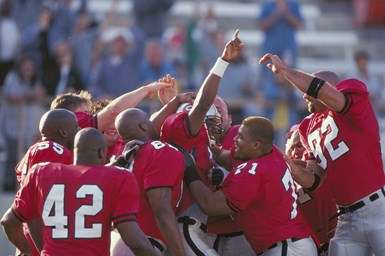What NFL Teams, Street Gangs and Your Workforce Have in Common
A sense of belonging is important for successful teamwork, retention and job performance.

A sense of belonging is a basic, human need. Photo Credit: Getty Images
A sense of belonging. It applies to family, the military, clubs, online groups and the list goes on and on. People want to belong to something bigger than themselves. Have you experienced that sinking feeling when you were left out of something? If you have, then you understand the need for belonging. Your business is a team and may even have teams within those teams. A sense of belonging is a strong production and retention tool for your workforce.
Belonging is Good Business
A sense of belonging is a basic, human need that marketers, businesses and Sam Malone have been exploiting for decades. Look around an NFL stadium and see how many fans are wearing team apparel or team colors. The people watching at home are probably wearing the team apparel as well.
The sense of belonging is so strong, fans say “we won” or “we lost” as if they were on the field. So why does a national team encourage this behavior? To create a strong bond that can endure even when times are hard, a team is losing or the world shuts down because of a virus.
Translate that sense of belonging to your business. Do your employees feel like part of the team? Feel like they belong? Harvard Business Review reported on a BetterUp study which showed that high belonging resulted with a “56% increase in job performance, a 50% drop in turnover risk, and a 75% reduction in sick days.” PMPA-PM0422. Think about how those results can affect your business.
How to Create a Sense of Belonging
There are many ways to create a sense of belonging and you can probably think of a few instances where you felt it. Use those instances as inspiration. Here are a few ideas to get you started:
- I’ve handed a business card to an employee with their name on it and witnessed the employee’s pride. The sense of belonging is instant. Almost magical. Even if an employee doesn’t need a business card, I’ll bet they went home and showed it off to their family. Business cards are an inexpensive way to show employees they are important and belong.
- Mimic the NFL and give your employees company shirts or t-shirts — they could even be designed by an employee. Ask everyone to wear it on the same day. Or wear company colors on the same day. Maybe the t-shirt has special meaning that the employees understand and would have to explain to an “outsider.”
- Keep them in the loop. It can be a short meeting, email or message on a board. Being “in the know” can go a long way toward making an employee feel like they belong.
- Ask their opinion. They have a unique perspective so ask their opinion on something. Even if it is the color of the new garbage cans you are buying. Give them a vote or a voice. It can be as simple as giving them a sticker to put on the image of the one they like. In the big picture, the color of the garbage cans doesn’t matter. What matters is that you bothered to ask them their opinion and they feel included.
- Celebrate birthdays. Everyone has one. It doesn’t need to be an elaborate party, but acknowledgement that you know their birthday and want to share it with others provides a sense of belonging.
As noted in the BetterUp study, taking the time to make your employees feel like part of the team can boost performance, retention and production.
About the Author
Carli Kistler-Miller
Carli Kistler-Miller, MBA, has over 20 years of experience with communications, event/meeting planning, marketing, writing and operations. Email cmiller@pmpa.org at PMPA.
Related Content
Strengthening Manufacturing Workplaces Through Active Listening
A good strategy to weather the storms of manufacturing market upheavals and unpredictable factors is to commit to continuous, active employee listening.
Read MoreManufacturing Skills Training: Virginia Martinez and Laiken Carrillo
Roles of Women in Manufacturing Series: A precision machining career starts with skills. Virginia and Laiken share their journey and how they help prepare the next generation.
Read MoreNew Thinking from the New Generation for the New Year
“We have to learn to think in a new way.” –Albert Einstein
Read MoreThe Value of Aligning Efforts to Promote Manufacturing Careers
Successfully building the next generation of manufacturers requires a team effort between employers, educators and parents. Each of these three groups has a tremendous impact on young people’s career decisions. Without the support of all three, we are unlikely to bridge the skilled labor shortage that threatens the future growth of our industry.
Read MoreRead Next
Do You Have Single Points of Failure?
Plans need to be in place before a catastrophic event occurs.
Read More5 Aspects of PMTS I Appreciate
The three-day edition of the 2025 Precision Machining Technology Show kicks off at the start of April. I’ll be there, and here are some reasons why.
Read MoreA Tooling Workshop Worth a Visit
Marubeni Citizen-Cincom’s tooling and accessory workshop offers a chance to learn more about ancillary devices that can boost machining efficiency and capability.
Read More






















